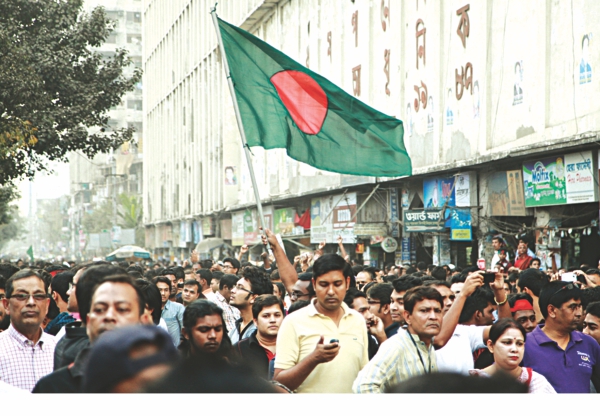Campus Musings

Young Bangladeshis all around the world want to be a part of the Shahbagh protest.
Shahbagh protest and beyond
Zulkarin Jahangir
Photo: Kazi Tahsin Agaz Apurbo
For the past few days, I have been experiencing a sharp pain in my chest, a discomfort that I can't really describe in words. I am not experiencing a cardiac event - my health is fine. Instead, I, like millions of other Bangladeshis who live abroad, am feeling a profound excitement about - and an eagerness to join - the Shahbagh Square protests. Since the protests began, my life has been overtaken by news reports on TV, social media, and online outlets. I wake up to my Facebook notifications, and I go to bed late, hoping I don't miss a single update from Shahbagh. We are transfixed by the ongoing protests, pulse racing with each new fragment of news - hence the flutter in my heart.
Why does this protest mean so much to me, and to my fellow Bangladeshis overseas? The atrocities of war criminals are beyond forgiveness and we all demand capital punishment. There is no different agenda in this crowd; the demand is very simple, and made this revolution of Shahbagh possible.
I became curious to learn how the historical importance of this revolution compares to other civil movements at pivotal points in history.
The US Civil Rights movement in 1960s led by the African-American population required a lengthy and costly fight against a long-standing, cultural (and, more importantly, legal) institution of racial discrimination. This protest was not obviously based on a single event, though several events were catalysts; it was a push for a massive 'systemic' political change in the country. It was similar to the series of Civil Rights protests in Northern Ireland between 1967 and 1972.
While there are significant differences among all these movements, there were commonalities as well. The fact that common people need to take their demand to the street is common in all these historic events.
During the Tiananmen Square protests of 1989, students assembled to mourn the deposing and death of a liberal reformer, and in doing so took a stand against the political hardliners in power. After a few days, a million protesters were demonstrating broader political issues, such as freedom of the press, democracy, and combating corruption, illustrating their desire for major political change. But in the Shahbagh protest, 'politics' are not what we are fighting for.

Protesters of Shahbag Square.
Many would consider the most famous 'apolitical' protest of recent time was of Wall Street occupancy in 2011,but this seemingly apolitical movement was rooted in economic disparity; therefore it was about political economy, led by an opposition group against those in control.
But what about the Shahbagh mass protest?
The gathering was a protest led by student and civilians as an outburst of conscience due to a long-awaited hearing from a war criminal tribunal. The hearing was inevitably meant to cause a reaction, but the Shahbagh protest has turned out to be an event of greater significance, because it was triggered by a deep core value. That's why in Shahbagh there is no leader or particular group steering this large crowd: it was a demonstration of pure consciousness and conscience. This creates an enormous, deep-seated power that accumulates with numbers, a common high ground beyond the individual citizens' association with BNP, AL or JP, creating a bond of single purpose, a crowd standing as one nation.
But how can we take this momentum forward? Its single agenda provided a laser focus that created tremendous strength of purpose. This kind of strength both binds the crowd together and creates enormous pressure to a system, government or societal norms. Because the movement is comprised of everyday people seeking true justice, it does not need a politician or a think tank to lead the massive force. Today we all stand for justice for the war criminals. Tomorrow, it may be one particular corruption case or one particular crime that we all agree must be resolved immediately. But, as Lao-Tzu stated, the journey of a thousand miles begins with a single step, and this revolution can be that single step toward that new beginning for Bangladesh we have all been awaiting, the new beginning that we have all envisioned.
(The writer is from SOAS, University of London)
| 